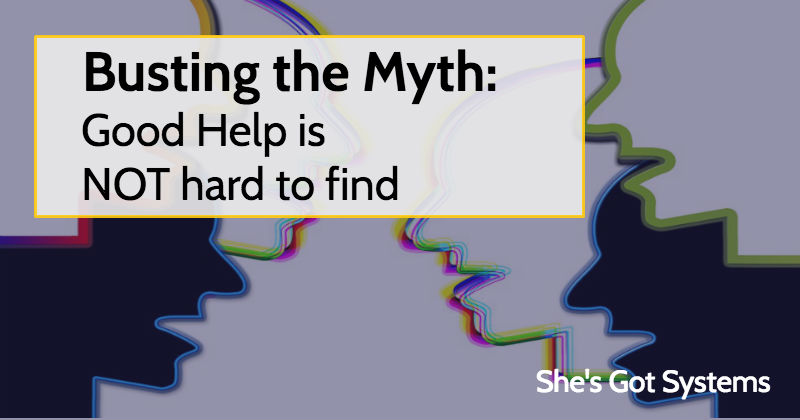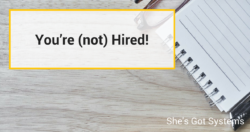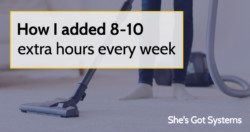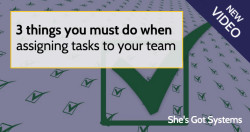Every time I hear an employer sigh and whine “good help is soooo hard to find” I want to scream a little. It’s not, I promise. But if you don’t have a strategy (and dare I say, a system) for finding the best people for your company then it’s likely that you’re hiring all the wrong people at the worst times and then failing your employees spectacularly. Today I want to talk about the 4 big mistakes and 4 system solutions for your next hire whether it’s a full time position, contract work or a virtual team member who you may never meet.
Mistake #1 – Waiting too long to hire
We all make bad decisions under pressure and when the stress in your business piles up until you feel like you’re drowning and need help now you’re likely to make poor choices on who can help you out. There’s something about desperation that brings out the opportunist sharks. Giving hiring the time it needs to do things right is critical!
My loose guidelines are 2-3 weeks total for a part-time position that will be long-term and 4-6 weeks for a permanent, full time position or one in a specialized area. Even if you think, right now, “I don’t need someone” you can and should put some systems into place so when you are ready it happens easier.
Remember, by the time you’re ready to hire help you’re so busy you won’t have time to hire!
Mistake #2 – Hiring quick, firing slow
This piggybacks on mistake #1 but when you’re in a pinch and need someone now you tend to hire quickly. Entrepreneurs are also uniquely bad at giving too many chances, either because they want to be cool and chill and not-corporate or because the idea of firing someone is intimidating. This means that an employee in your small business could be making big mistakes for a long time before you come to your senses.
You’ve heard it before: Hire slow and fire quick! My record is 30 minutes with a VA before I said, “this isn’t going to work” and let her go. Don’t waste your time (or theirs) when it’s not a good fit. Having a longer hiring process works too, true character is revealed over time so when someone is great on the first date interview but then doesn’t show up for the next date appointment you’ve dodged a hiring bullet.
Mistake #3 – Relying on the wrong information
The absolute last thing I need to see when I’m hiring is a resume. I know, we’ve all created one at some point and it sits, gathering virtual dust, until someone needs it and polishes it up to send to hundreds or thousands of employers. That’s nice.
Instead of a resume, I want to know answers to MY questions, detailed responses that require more than a copy/paste answer. I want candidates to use their gray matter to show me that they a) care about the job and b) have skills in business that will outshine other candidates. Relying on the same information as everyone else gets you the same candidates as everyone else.
Mistake #4 – Giving insufficient resources
You’re hired! Great, now what? If you’re like most companies and entrepreneurs then you might set up a new email, spend some time training, in person or by phone, and then send them out into the wild.
Or maybe you’re like the first entrepreneur I worked for as a virtual assistant, who I met over google chat, when then gave me a credit card number and asked me to book a flight. Before our contract was signed or I had any idea what was going on.
If you want support getting things done your way (don’t look at me like that, you’re an entrepreneur and we’re nothing if not stubborn), then you need to give the resources for people to do their job well. This could be as simple as letting that assistant know you prefer to fly first class, aisle seat and never depart before 9am or giving them the logins to access your website if they’ll be managing content.
No matter what this new hire is doing for you, without the resources and systems in place it’s going to be an uphill battle.
So let’s make it a little simpler.
Systems Solution #1 – Know WHO you want to hire before deciding WHAT they will do
This might be a little counterintuitive but go with me for a moment. You’re going to be running your business, in it day in and day out for years or decades. In addition to doing the things that make you happy, you’ll want to surround yourself with the people who you enjoy. Hours and hours and hours of your life will be spent working very closely with someone and if they are obnoxious or just rub you the wrong way then work will be hellish.
Start with the who, what kind of person is this new hire? How do they respond to problems? What is their outlook on life?
It seems odd starting with the soft science of hiring but if you prefer someone who can make you laugh, appreciates a sarcastic comment and loves to figure out puzzles then you might be miserable with a soft spoken, shy assistant who wants everyone to get along and asks for help immediately when stuck. And vice-versa. There’s no “right” answer here – who you want in a position is personal and how they react to problems may be position specific. Get clear on the who first, then dive deeper into what they’ll do and how you’ll find them.
Systems Solution #2 – Ask candidates to jump through strategic hoops
I have no qualms about asking a candidate to jump through a hoop or 6 to secure the job. Resumes are pretty useless to me because they reflect past work, not necessarily future potential. So instead of saying “have you done this” I simply ask candidates to do it now, in an abbreviated fashion.
This might mean getting a candidate to read an article and write a few tweets or summarize for our newsletter to test reading comprehension and how well they understand the business. Or giving a scenario and asking the candidate to draft an email proposing a solution to the problem.
Candidates who don’t want to work will not last long in our company and testing their abilities is faster, easier and cheaper if done before hiring.
Systems Solution #3 – Hold a better interview
Testing a candidate can happen in several stages: in the application process, pre-interview and during the interview. Finding out how someone thinks on their feet is important so ask good questions. Skip “where do you see yourself in 5 years” and “what makes you qualified for this job” and go for more interesting questions such as “tell me what software you would use to solve this type of problem” or “a client calls needing x and y in the next hour, I’m on a plane and unavailable, how do you respond?”
My other big tip for interviews is stop chasing candidates. If possible schedule a block of time to interview all the candidates and book them back-to-back in 15 minute blocks. Ask the candidate to call YOU, on Skype or a conference line if possible. You’re subtly testing their ability to show up on time and follow instructions.
If you really want to see who shows up prepared to work as them to fill out a personality test online and bring their results to the call, I’ve been able to eliminate candidates who “forgot” or lost their results because it tells me they’re not going to do so well showing up to team calls later on. Harsh? Maybe, but if you’re looking for the best person out there then you need to eliminate those who aren’t ready for the job.
Systems Solution #4 – Build systems beforehand or together
In my ideal world companies would always have a detailed job description for each position and complete systems outlining how to do each and every task required.
But I live in this world and that’s just unrealistic.
Instead, aim to have a list of job tasks that you want this new person to fulfill and then work together to create the system they will follow. This might involve simply training them verbally but asking the new hire to document everything you tell them for the system. However you do it, you need to create a process and written system for all the things you want done in your business your way, even if it takes time to put together.
Hiring the right people isn’t that hard; it just takes the right strategy.
We’ve all made hiring mistakes along the way, share with me what you’ve learned in the comments!

 You’re (not) Hired!
You’re (not) Hired! How I added 8-10 extra hours every week
How I added 8-10 extra hours every week 3 things you must do when assigning tasks to your team
3 things you must do when assigning tasks to your team